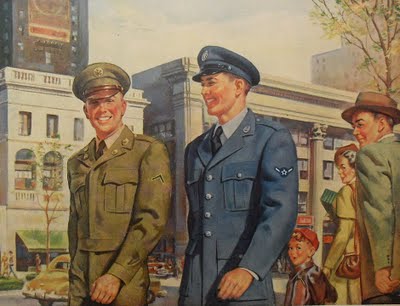David Swanson -
"About Face: Military Resisters Turn Against War," is a book that should be stacked up on a table in every high school cafeteria, next to the vultures. Sorry, I mean the war pushers. Sorry, I mean the good recruiters for the services of the profiteers of death. Sorry, you know the people I mean. That is, unless useful books can make it into classrooms, which would be even better.
Most G.I. resistance in Vietnam, this book points out, came from those who had willingly signed up, not from draftees. It is often those who believe the hype, who are trying to benefit the world by going to war, who find the will try to benefit the world when their blinders have been removed and they've seen what war is and what war is used for.
"About Face" collects stories of recent resistance within the "volunteer" U.S. military. These are young people with few job options who choose military "service" but discover it isn't a service. They all have stories, many of them highlighting particular moments of conversion. The reality is usually more complex and gradual, but the stories make the point.
Benji Lewis was a Marine in Iraq. After two “tours” he gave some thought to things that had happened on his first tour, including this:
“They were shooting at this lady who was walking up to our posts waving her arms and asking for help in Arabic. So I came up close and talked to her, and her face looked like death itself. She had salt crusted all over her face. It was obvious that she had been crying for quite a bit. I kind of got the story that she had a family. We were like, ‘Go back home, go to your family.’ And then it came out that she was asking for help. Three days ago, her entire family, her children, had been pretty much buried in the rubble of their house, and she was asking for help. I asked my staff sergeant, ‘Can we help her?’ He said to tell her to walk to the Red Cross aid station, which was a few miles away. We couldn’t leave our posts to help her, so we gave her a couple of bottles of water and wished her luck, you know. It downed on me later on that me being the adjusting gunner for the mortar section, there was a good probability that I was the one that put those rounds on her house.”
Lewis refused orders for his Individual Ready Reserve recall and was discharged with no penalties. While some resisters are punished, that does not seem to be the norm. Often the resistance takes the form of going AWOL, and in some cases later turning oneself in. Andre Shepherd sought refugee status in Germany:
“I made a decision during [a] two-week period that I would have to walk away from the service rather than either get myself killed or get somebody else killed in a war that was based on a pack of lies.”
Some resisters don’t believe they should request conscientious objector status, because that requires opposing all wars. Having come to see through the lies and horror of one war, they still fantasize that some other war might be a good idea. Those who do apply for conscientious objector status don’t always receive it, but many do. Hart Viges joined up in 2001, gung ho for the war on terra. He was honorably discharged as a conscientious objector three years later. “I am opposed to all wars,” he says. “When anybody picks up a tool to violently fight their brother or sister, I am opposed to it and do not support it. I finally found my fight, my good fight. It’s the path that I am most comfortable with, more comfortable with myself than I have ever been in the rest of my life.” Telling the truth about war turns out to be great therapy for veterans and for our whole society.
But the stories should perhaps be taken in small doses. Reading through these books without pause can make you understand why it is sometimes the counselors who hear all the soldiers’ stories who end up losing their own minds. “About Face” informs potential recruits and those already recruited that they have options, as well as informing aging peace activists where the young ones are: they’re among the veterans. Many other books and videos can add to the reality that needs to be communicated to a culture increasingly viewing war as a harmless sport. Probably the most powerful collection of veterans’ stories I’ve read is “Bloody Hell” by Dan Hallock. This is essentially an uncensored view of what can become of you if you don’t resist.
“Bloody Hell” shows us homeless men, men mad with nightmares, in prison, on death row, drunk, weeping, drugged, screaming, suicidal, and unable to prevent themselves from harming those they love. A Vietnam veteran identified as Lee married and had a little girl with a Vietnamese woman while stationed in Vietnam during the war. That wife and daughter, plus drug use, were what carried him through the hell he was a part of, the killing and the dying all around him. But the Army denied the legitimacy of his marriage and made clear he would have to leave his wife and daughter behind or desert:
“Chi and I met one last time before I was supposed to leave. We both cried our eyes out. It was so bad, so much pain. We trembled in each other’s arms. I left her and went back to my unit. Then she sent me a note saying to meet her at a cliff above the South China Sea, a very beautiful place where we had gone a lot. I went. I was leaving tomorrow, so I had to see her today. I took an officer’s jeep and drove to the cliff. There they were, waiting, crying. We didn’t talk, we just held each other, with Le in between us. We cried so much. I reached into my pocket and took out my pistol, put it to Chi’s head and pulled the trigger. There was a splatter — then her blood gushed out — all over me. I held her tightly — with Le screaming still between us. I held her as long as I could — then let her go — over the cliff and into the sea they both fell. I pounded the earth as hard as I could — I screamed till I had no voice. I had nothing left inside me when I drove back. I should have died in Vietnam instead of living the thousands of deaths that I have. Back at the hooch no one said a word to me. I had walked in covered with blood and looked pretty bad — no one said a word.”
Lee recounts his life back in the United States as a veteran, with a new wife, and a new child. You can imagine. But you should read it. Everyone should. Especially everyone who’s 17 and not the child of a billionaire.
Shooting Your Own Side
Veterans’ stories often depict war differently from what the television told us. Drones won’t talk, of course, but human warriors tell us how early the 2003 invasion of Iraq began, how the Gulf of Tonkin incident didn’t happen, and how countless families have been murdered rather than liberated. “Bloody Hell” includes an account from a veteran named Doug of the 1989 U.S. attack on Panama. I had known that the war plans had been in place months before an incident that was used to justify this “intervention” against long-time U.S.-backed dictator Manuel Noriega. Some drunk Panamanian soldiers had beaten up a U.S. navy officer and threatened his wife. But listen to this account from Doug:
“At Fort Bragg I was ordered to go on a mission against a group of people I had never dreamed of — our own soldiers. I was assembled along with Michael and four other men whom I never had met before. We were among the few soldiers in the U.S. Army at the time with combat experience, with confirmed sniper kills; we were also the best of the best. The thinking at the Pentagon was that to get the soldiers stationed in Panama to fight, they had to have very good reasons. We’re talking here about soldiers who have never experienced combat before. And the best way to get them riled up was to attack them. When Michael asked what the other four men in our mission were doing, we were told it was none of our business. You see, American soldiers, especially infantry soldiers, stick together. If one of them gets into a predicament in a bar — I mean a fight — the others don’t walk away, they join in. You don’t fight one of them, you fight all of them. Their training has taught them to be a team; they depend on each other, and it doesn’t matter if it’s a barroom brawl or not. They depend on each other to get home. So what better way to get them all worked up than to take pot shots at them? We were told that we would be saving lives by doing this. For weeks leading up to the invasion of Panama, Michael and I took pot shots at soldiers during the night.”
There’s wrong.
And then there’s Army wrong.
source: http://warisacrime.org/content/about-face-bloody-hell

 David Swanson is the author of the new book, Daybreak: Undoing the Imperial Presidency and Forming a More Perfect Union, by Seven Stories Press and of the introduction to The 35 Articles of Impeachment and the Case for Prosecuting George W. Bush by Dennis Kucinich. In addition to cofounding AfterDowningStreet.org, he is the Washington director of Democrats.com and sits on the boards of a number of progressive organizations in Washington, DC.
David Swanson is the author of the new book, Daybreak: Undoing the Imperial Presidency and Forming a More Perfect Union, by Seven Stories Press and of the introduction to The 35 Articles of Impeachment and the Case for Prosecuting George W. Bush by Dennis Kucinich. In addition to cofounding AfterDowningStreet.org, he is the Washington director of Democrats.com and sits on the boards of a number of progressive organizations in Washington, DC. Thank you to Bruce Kent and the Movement for the Abolition of War and to Veterans For Peace and the Campaign for Nuclear Disarmament. Thank you to the Stop the War Coalition and everyone else for helping spread the word.
Thank you to Bruce Kent and the Movement for the Abolition of War and to Veterans For Peace and the Campaign for Nuclear Disarmament. Thank you to the Stop the War Coalition and everyone else for helping spread the word. Remarkably, the U.S. Army War College has published a report (
Remarkably, the U.S. Army War College has published a report (